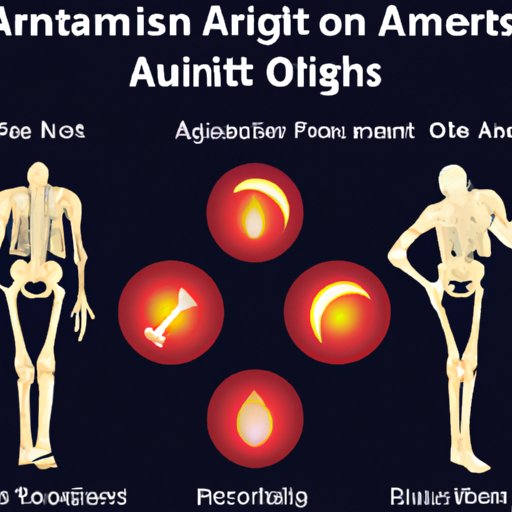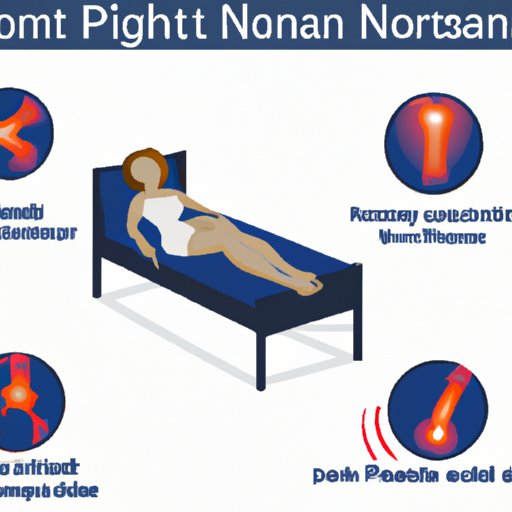Introduction
Many people experience nighttime bone pain, which can be quite uncomfortable and disruptive to sleep. It’s essential to understand the science behind why this happens to find solutions to alleviate the pain. This article aims to delve into the root causes of nighttime bone pain and explore possible remedies for it.
Untangling the Mystery Behind Nighttime Bone Pain
So what exactly is nighttime bone pain, and why do people experience it? Nighttime bone pain is discomfort felt in the bones during the night. It’s different from daytime bone pain, which is more commonly due to injuries or diseases. Common areas where people experience bone pain at night include the knees, hips, and back.
The Science of Joint Pain: Understanding Why Bones Ache at Night
The body produces different hormones at different times of the day, and this can affect pain perception. Melatonin, a hormone that regulates sleep, can also affect pain. Research shows that people have lower pain thresholds and less pain tolerance at night than during the day. Cortisol, a hormone that helps the body manage stress, also contributes to pain perception.
Another factor that contributes to joint pain at night is the body’s natural inflammatory response. When the body detects an injury, it triggers an inflammatory response mechanism. During the night, the body’s immune system is most active, and if inflammation is present, it can cause joint pain.
When Your Skeleton is Speaking to You: Investigating Why Bones Ache at Night
Several medical conditions can cause nighttime bone pain. Arthritis, osteoporosis, fibromyalgia, and lupus are some common disorders that can lead to this issue. People experiencing bone pain should check for other symptoms or health conditions and know when to consult with their doctor or healthcare provider.
Exploring the Relationship Between Sleep and Bone Pain
Quality sleep is essential in preventing nighttime bone pain. A lack of sleep can aggravate bone pain and increase its severity. To promote better sleep hygiene, one should aim for 7-8 hours of sleep each night, create a regular sleep schedule, and eliminate distractions from the bedroom environment.
Solutions for Combatting Nighttime Bone Aches
Several remedies can alleviate nighttime bone aches. One possible solution is heat therapy, which can reduce inflammation and promote relaxation. Physical therapy, exercise, and stretching can also improve bone health and reduce joint pain. Over-the-counter pain relievers such as ibuprofen and acetaminophen may help manage pain. Depending on the cause and severity of the bone pain, a healthcare provider may suggest other medical treatments.

From Arthritis to Injuries: Common Causes of Nighttime Bone Pain
As previously mentioned, arthritis, osteoporosis, fibromyalgia, and lupus are common medical conditions that can cause nighttime bone pain. Certain injuries can also lead to bone pain at night, such as ligament or tendon strains. It’s essential to seek medical attention when experiencing bone pain to determine the underlying cause.
The Impact of Diet and Lifestyle on Nighttime Bone Pain
An unhealthy diet and lifestyle can contribute to bone pain at night. To reduce joint pain, it’s crucial to maintain a healthy weight, reduce stress levels, and reduce alcohol consumption. Nutrients such as calcium, vitamin D, and magnesium are essential for bone health, and a diet rich in whole grains, fruits, and vegetables can improve overall bone health and reduce bone pain.
Conclusion
Nighttime bone pain can be quite distressing, but understanding the underlying causes and possible solutions can make things easier. To combat bone pain at night, it’s essential to maintain a healthy diet and lifestyle, get enough exercise, and emphasize quality sleep. If experiencing chronic bone pain, it’s crucial to speak to a healthcare provider to determine the underlying cause and explore medical treatments.
